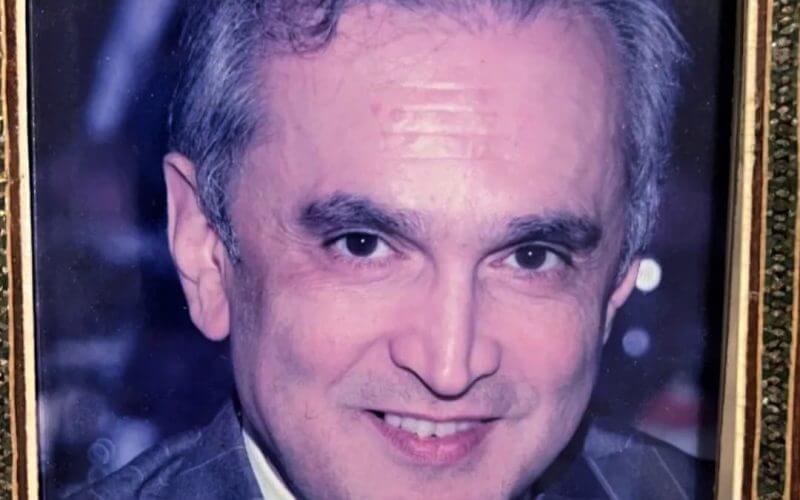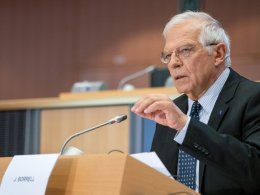The first time I met Faryar was about 17 years ago when I was new to Los Angeles and a graduate student working on a documentary thesis. That’s when Roozbeh Farahanipour generously introduced me to all the smartest and sharpest Iran experts and activists in the city, and of course, in saving the best for last, he arranged a meeting between himself, Faryar and me one night at Palomino restaurant in Westwood.
I remember the very first moments of my encounter with Faryar. He was funny, charming, and definitely not as serious as one would think for someone whose resume and level of expertise preceded him.
But very quickly as he began to speak, I was awe-struck at his level of knowledge. He was undoubtedly a human encyclopedia; A wiz at history and politics, but most outstanding was the sharp and astute way he would be able to intertwine and weave these two together. He would always quote dates and events off the top of his head, and when giving his prediction on world happenings, he would effortlessly draw historical parallels to support his point of view.
His knowledge on history and world events was second-to-none, but the distinctive way he would sip his chocolate martini in between the pauses and the political rants was most memorable.
After that first meeting, I remember recalling the evening to my mother and telling her, "You just want to record everything that comes out of this guy’s mouth! Everything is gold!"
And it was true, for a student who was studying journalism and pivoting into commentating about Iran and the Middle East, meeting Faryar was one of the most if not most influential occurrences of my journey and career.
Soon after, Faryar became my first go-to for any questions on history or current events, particularly for the way he would contextualize and be able to see any snippet of time, whether in the past or present, so clearly in historical timeline. He didn’t just give me the short answer, he wanted me to understand the issue in a larger sense. He would explain what was happening and its ramifications, and then he’d propose a novel way to report on it or expose it.
I would email him before starting any article and message him before going on any TV hits. He would always respond in the same way- kindly, encouragingly, and brilliantly. And often at 3am.
His emails had on average 10 to 12 paragraphs each, and sometimes he would say, “Lisa Jaan, I’m busy at the moment so I will write more later…,” but he still wrote a ton and guess what? He would still write back later with more.
And if he thought of something else, he’d write back even more hours, days or sometimes weeks later.
His mind was incredibly special, but his dedication to me personally was beyond that of a mentor. He never looked to my successes with resent or envy the way many others have throughout my career. On the contrary, my win was his win. He educated me with pleasure. He went out of his way to send me articles to read, video snippets to watch and always helped me stay up to date with the latest news and commentary.
It was often that Faryar would humble me with his loyalty. I would always look forward to seeing his supportive and enthusiastic face in the crowd anytime I would give a talk. He would sit in the front row and listen intently, letting me know he was on my team. When I would go on air, he would never miss a show and the one time that he did, I remember getting his email the very next morning about how he didn’t realize he missed it and asked me to send the link right away.
Then, without me asking, he would always send notes, starting off with a compliment the way he did all his emails. This was the unique thing about Faryar. His mind was probably racing with a million facts he wanted to impart, but he took the time to start with a sentiment of support. His notes were mini books. He went to such great lengths to tell me his thoughts – and again, in Faryar fashion, he spent more time telling me what went right than wrong. And always, with a tone of encouragement and praise.
Something many people don’t know about Faryar is how funny and witty he was. He always inserted his sharp sense of humor and many times sarcasm into his political rants, which was unique to who he was. He also understood the material so well, his command over it allowed him to be playful and funny. He had a brand of his own that no one can ever replicate.
Faryar’s passing has made me think and reflect very deeply about our 17-year friendship in a way I had never before. I realized that Faryar and I clicked very quickly. From the first meeting it felt like we had known each other for years. And it wasn’t because of politics or work or Iran. It was much deeper than that. In many ways, I felt that Faryar got me – really saw me for who I was and what drove me, and I got him- seeing past the political talking points and world-class knowledge to see the man with the gentle heart and generous spirit.
When I got engaged, I told him he had such a wonderful character that I went and found myself a Hamedooni husband to which he was extremely delighted.
And then, during my wedding weekend, President Trump withdrew from the Iran nuclear deal and the embassy in Israel was moved from Tel Aviv to Jerusalem. Faryar wrote me to say, “this is your time Lisa Jaan. You earned it. All this stuff will be waiting here for you when you get back to your desk.” Of all the interactions we had, for some reason this stood out to me the most. That was the thoughtful, kind, gentle, human Faryar I loved.
For almost two decades, he was the master, the coach, and I was the extremely lucky student he believed in. Although in some ways it felt more like we were two kids- two playmates--who had an affinity toward each other for the passion we had for life and the enthusiasm we had in advocating for others.
When I think down to the core of our relationship, maybe we understood each other because we were both dreamers. I was drawn not only to his incredible knowledge and ability to communicate his thoughts clearly and boldly, but like many others, I was captivated by how Faryar had dedicated his life to carrying out his dreams; Fighting for his ideals—freedom for Iran, freedom for religious minorities, freedom for political prisoners, freedom of thought and speech.
In this arena, his dedication and determination were unparalleled. The way he would advocate for and raise awareness about human rights victims helped save the lives of those who don’t even know his name. And that’s how he wanted it. While Faryar operated on the world stage, he was not one to want the glory of it. He never claimed credit nor was he comfortable receiving accolades. He worked humbly and behind the scenes, to the very end.
Every tool and talent God gave him…and he gave him so many…he used to help others. That was the epitome of Faryar.
My ostad, my mentor, my guru, my friend…so many words to describe you yet no words do justice to what your presence was here on earth and what your essence meant to each one of us who were blessed to be in your small circle of friends and confidants.
I already feel your absence and the thought of never being able to send you a quick email or text again hurts deeply.
Without you, who will cry out for the marginalized? Who will champion the victims?
I will never forget what you have done for me, and I will never let the world forget what you have done for humanity.
I love you, Faryar.










